Foreword
For this Lunar New Year Tết 2025, I wanted to share something other than the same old traditional dishes. The totally improbable idea of fusion cuisine came to me. Now, let me confide a secret: I'm an old school guy. For me, a traditional recipe is sacred. You don't touch it. But, because open-mindedness is a virtue (and not a skull fracture), and because I don't want to be accused of living in the past (even if sometimes the past tastes damn good), I looked into this... let's say... interesting culinary phenomenon. You tell me what you think in the comments!
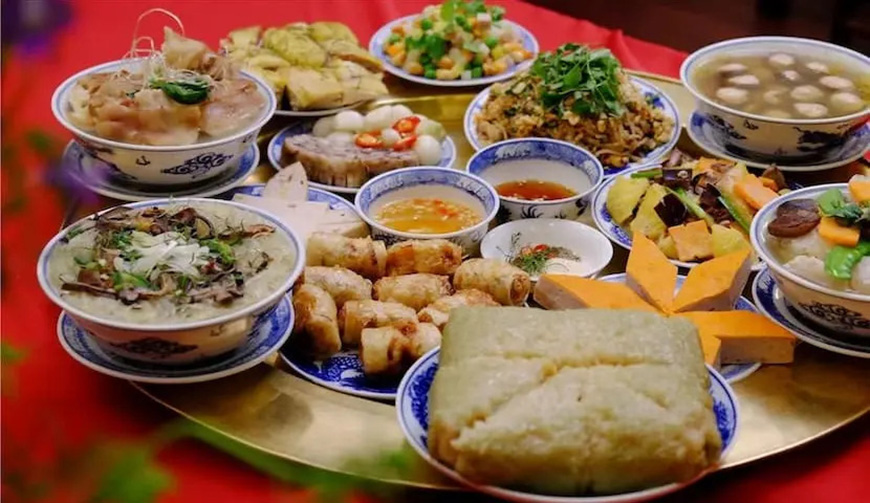
More than just a date, Tết is a deeply significant celebration for the Vietnamese - Photo : internet
As an appetizer
Tết, the Vietnamese Lunar New Year, is much more than just a date on the calendar. It's an immersion into the heart of Vietnamese culture, a vibrant celebration of renewal, family ties, and ancestral traditions. At the center of this effervescence, Tết cuisine occupies a place of choice, a true gustatory language that tells the story and soul of the country. While Tết Nguyên Đán is deeply rooted in culinary customs, a breeze of modernity is now blowing on the tables, mixing heritage and contemporary influences. Let's discover this strange transformation, where tradition reinvents itself without losing its essence (or so we are promised).
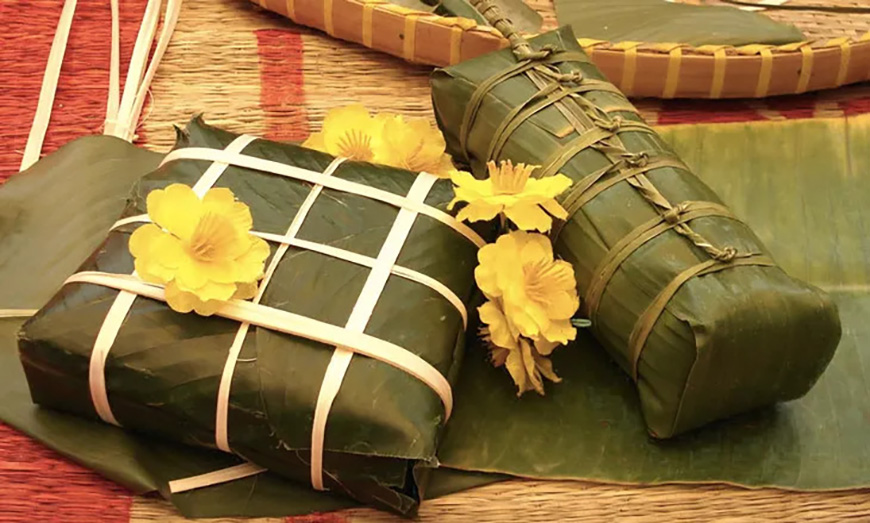
Bánh Chưng and Bánh Tét are signature dishes of Tet-Photo : Internet
Flavors and traditions: A gourmet heritage
Tết dishes are not mere food; they are carriers of symbols, embodying prosperity, health, and longevity. Each family gathers to prepare and share a feast, where each dish tells a story, conveys a meaning. The importance of these dishes transcends simple gustatory pleasure: it is a vector of history, culture, and family love, passed down from generation to generation. Understanding these dishes is to understand Tết in all its richness and its vital role in Vietnamese culture.
Tết cuisine is distinctly different from everyday cuisine. While the latter emphasizes freshness and balance of flavors, Tết dishes are more elaborate, requiring complex preparations and specific ingredients. They are not limited to taste; they weave a mosaic of cultural beliefs, homages to ancestors, and wishes for prosperity for the coming year.
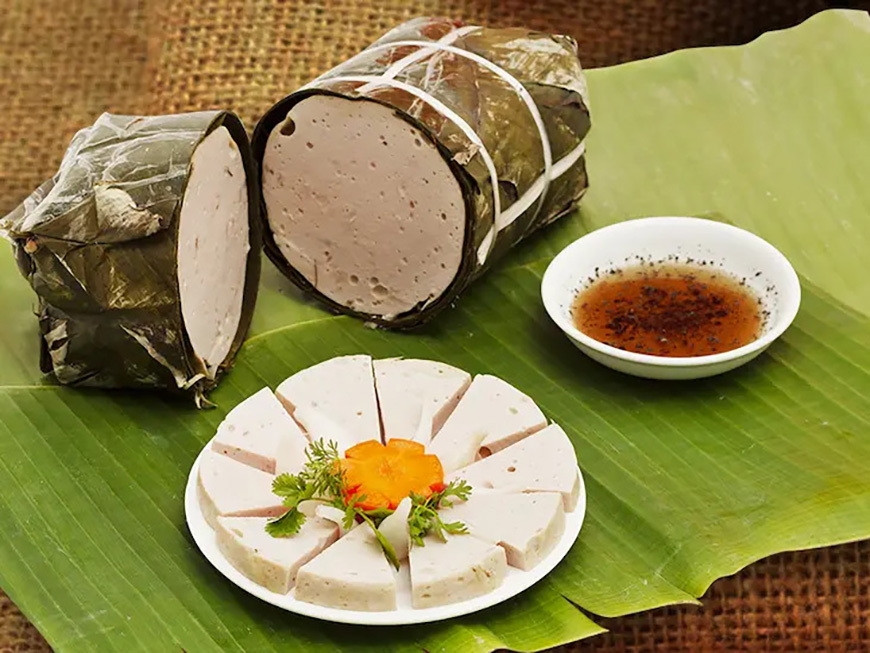
Giò lụa is a must-have for Tết feasts - Photo : Internet
During Tết, food becomes the pivot of family gatherings. Families reunite, sometimes after long journeys, and Tết cuisine serves as an intergenerational link, uniting guests around the preparation and sharing of traditional dishes. Cooking and eating together is celebrating the New Year while strengthening family ties and honoring ancestors. The preparation of certain dishes, such as bánh chưng (square sticky rice cake), is a true family ritual, where everyone has a role to play. Thus, Tết cuisine is the beating heart of the festivities, embodying family warmth, cultural richness, and the dynamism of Vietnamese heritage.
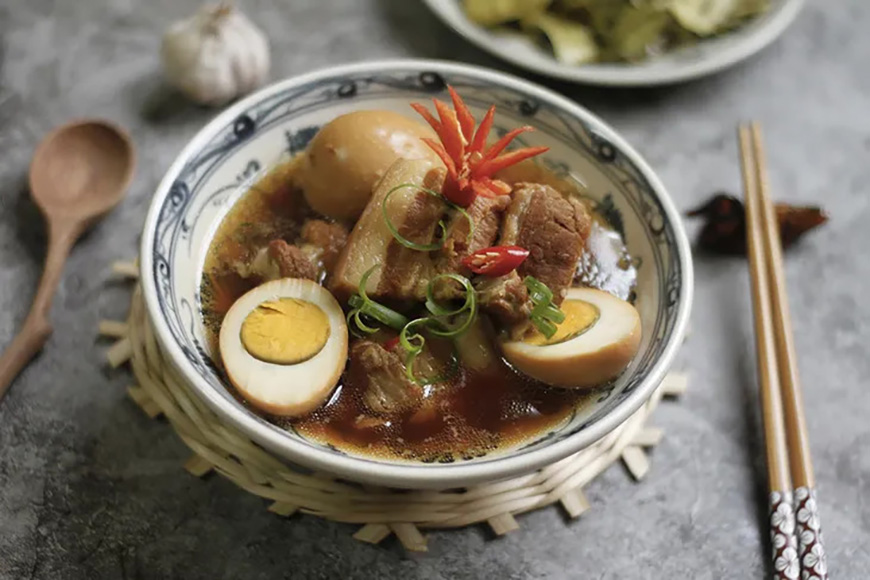
Caramelized pork and eggs symbolize prosperity and plentifulness-Photo : Internet
The must-haves of Tết: A feast of symbols
Bánh Chưng and Bánh Tét
Emblems of Tết, the square bánh chưng symbolizes the Earth, while the cylindrical bánh tét represents the Moon. These two sticky rice cakes, stuffed with mung beans and pork, wrapped in banana leaves, testify to a long, often collective preparation, a symbol of unity.
Thịt Kho Tàu (Caramelized pork and eggs)
This savory and sweet dish, made with pork belly and eggs simmered in coconut milk, evokes wealth and abundance. More than just a delight, it embodies family warmth and the joy of the Lunar New Year.
Giò Lụa (Vietnamese pork sausage)
A finely textured pork sausage, giò lụa is a must-have for Tết feasts. Its delicate flavor pairs perfectly with sticky rice and pickled onions.
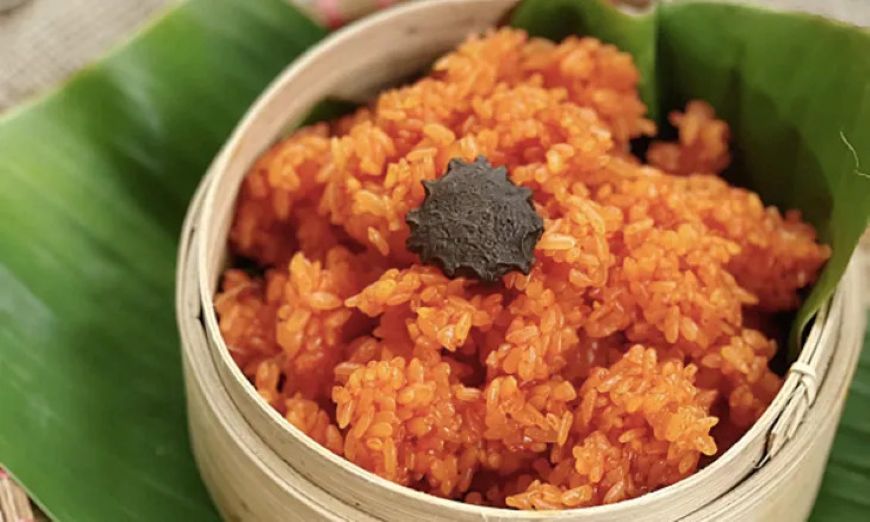
Red sticky rice represents good fortune and abundance-Photo : internet
Xôi Gấc (Red sticky rice)
Colored a bright red thanks to the pulp and seeds of Gấc (a local fruit), this sticky rice symbolizes luck and prosperity, making it a festive dish par excellence.
Mứt (Candied fruits)
These sweets, made from dried fruits and sugar-coated seeds, are not only a treat for the taste buds, but also the symbol of a sweet and joyful year.
Each dish, therefore, plays an essential role in the celebrations, both through its flavors and its cultural and symbolic significance. Together, they compose a mosaic of tastes and traditions that form the very essence of Tết cuisine.
It is worth noting here that Tết cuisine varies by region of Vietnam. In the North, the dishes are hearty (bánh chưng, giò thủ) to withstand the cold. In the Center, the royal heritage influences a more refined cuisine (bánh tét, nem chua). In the South, the flavors are sweeter and the dishes more varied thanks to the climate (thịt kho tàu, mứt). This diversity reflects the traditions and geography of each region.
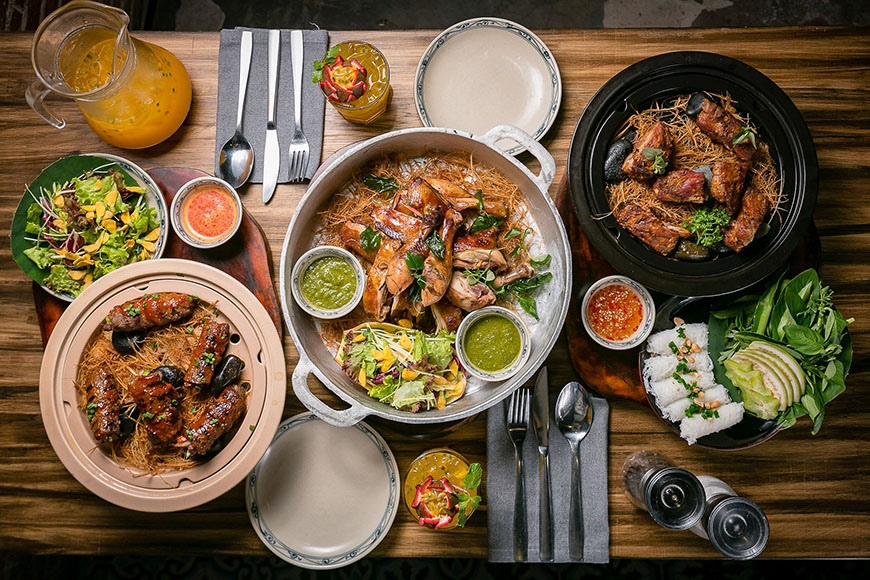
Vietnamese fusion cuisine blends Vietnamese flavors with other culinary traditions, creating innovative dishes - Photo : Eleven Restaurant
The call of fusion: A dialogue of flavors
Food, more than anything, has the power to bring people together. It becomes a sophisticated and creative cultural crossroads, the result of exploring combinations and the talent of chefs. Culinary fusion, in particular, sublimates the experience by converging the cultural aspects of different countries in a single dish. It sparks passionate conversations about cultural diversity, the origin of food, its transformation, and its integration into local customs.
Modern variations: When tradition meets innovation
In recent years, Tết cuisine has undergone a fascinating evolution, integrating fusion dishes and contemporary adaptations while respecting its roots. This marriage of old and new reflects the dynamism of Vietnamese cuisine and its openness to global trends.
Fusion dishes
Chefs and cooks experiment with traditional recipes by incorporating flavors and techniques from other cuisines. Bánh chưng, for example, is now available with daring fillings such as salmon or truffle oil, offering a luxurious touch to a familiar taste. These innovations appeal as much to palates seeking novelty as to the Vietnamese diaspora, which mixes its heritage with the influences of its adopted cultures.
Contemporary adaptations
Modern lifestyles have also influenced Tết cuisine. Health concerns translate into a reduction of sugar in mứt or the use of leaner cuts of meat in thịt kho tàu. Interest in vegetarian and vegan options is also growing.
Influence of global trends
The rise of social networks and culinary blogs has exposed Tết cuisine to a global audience, generating interest and experimentation. This exposure has led to a greater appreciation of Vietnamese culinary traditions and has inspired international chefs to revisit Tết dishes, bringing their own touch.
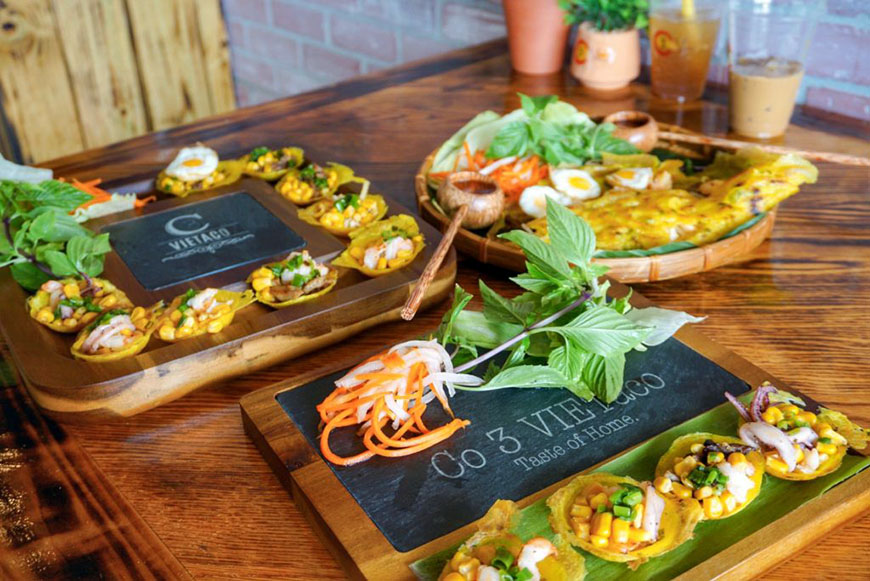
Banh Mi revisited, a taco version - Photo : Co 3 -Vietaco Restaurant, Florida - USA
Examples of fusion dishes: A gustatory journey
Fusion Phở: Modern variations of traditional phở incorporate unexpected ingredients such as curry or garnishes inspired by foreign cuisines.
Revisited Bánh Chưng: Chefs offer high-end versions with fillings such as smoked duck or wild mushrooms.
Innovative desserts: Creations such as Hoa Loc mango cheesecake or red berry mousse combine local flavors with modern pastry techniques.

Xa Lua Fusion - Photo Eleven Restaurant
A heritage in motion
Modern Tết cuisine perfectly illustrates the ability of a tradition to evolve while remaining true to its roots. By integrating fusion elements and adapting to contemporary trends, Vietnamese chefs make this celebration even more accessible and attractive to new generations. This dynamic ensures the continuity of the culinary richness of Tết while celebrating its unique cultural heritage.